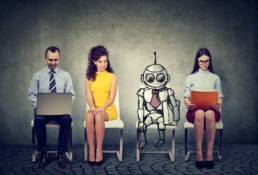Artificial intelligence (AI) could potentially pose a significant threat to digital marketing agencies, as it has the ability to automate many tasks that are currently done by mere mortals.
Some of the ways that AI could impact digital marketing agencies include:
- Automation of content creation: AI-powered tools like ChatGPT can generate written content quickly and with a high degree of coherence, which could make it harder for agencies to justify charging clients for writing services.
- Increased competition: As the cost of using AI-powered tools decreases, more companies may start to use them, which could lead to increased competition for digital marketing agencies.
- Decrease in job opportunities: AI may automate certain tasks that are currently done by human workers, which could lead to a decrease in job opportunities in the digital marketing industry.
- Improved targeting and personalization: AI-powered tools can analyze large amounts of data quickly, which can help companies to target their advertising more effectively and personalize their marketing messages.
- Improved ROI: With the help of AI, companies can make data-driven decisions, optimise their campaigns and get a better return on investment.
However…
It’s worth noting that these potential challenges should be seen as opportunities for digital marketing agencies to adapt and create new services by using new technology.
Some of the most significant opportunities include:
- Improved targeting and personalization: AI-powered tools can analyse large amounts of data quickly, which can help companies to target their advertising more effectively and personalise their marketing messages. This can lead to higher conversion rates and better customer engagement.
- Automation of repetitive tasks: AI can automate repetitive tasks such as data entry, campaign optimisation, and lead scoring, which can help agencies increase efficiency and reduce labour costs.
- Improved ROI: With the help of AI, companies can make data-driven decisions, optimise their campaigns and get a better return on investment.
- Predictive modelling: AI can help predict consumer behaviour, allowing companies to anticipate trends and create more effective marketing strategies.
- Chatbot and voice assistants: AI-powered chatbots and voice assistants can be used to provide 24/7 customer service and automate the sales process, improving customer experience.
- Content Generation: AI-powered tools can help to generate unique and high-quality content in a fraction of the time, which can be used for social media posts, email campaigns, blog posts and more.
With the right skills and approach, agencies can leverage AI to improve their services, increase efficiency, and offer new value to their clients.
*Disclaimer: The above article was entirely written by AI
Here at Terra Ferma Media, we’re not overly concerned about being replaced just yet. As you can see from the content above, this blog post comes across as devoid of personality and fairly mundane, even repetitive. Plus, currently, the most popular AI chatbot service has only gathered data up until the end of 2021. So – asking it to write an article about Rishi Sunak’s role as Prime Minister will draw a huge blank.
Furthermore, apps are being developed (as always) to counterbalance the onslaught of AI chatbots by easily identifying when content has been created by artificial intelligence. There’s even talk that Google Search may soon count identified chatbot content as spam, thus negatively impacting offending website rankings.
So tread carefully when deciding whether to use AI to instantly create your next copy project. There’s still some fight in us humans yet.
Oh, and what’s more, the real world is fighting back: AI image creator faces legal challenges from Getty


